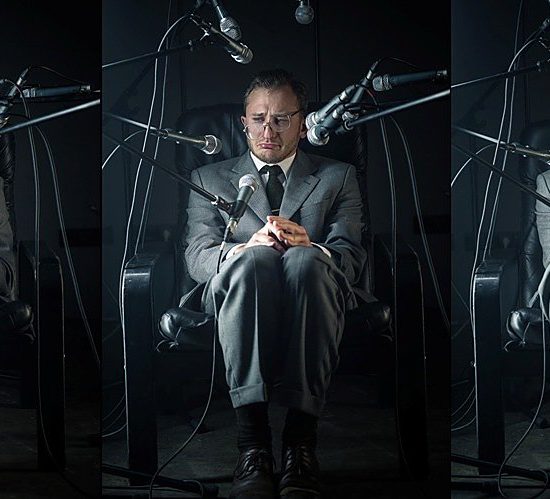Cheating loneliness
[…]
“Krapp’s Last Tape” is a play about a person’s life, and their choices that do not make them proud, the obligation to live in the past, not having a future. It seems to be one of the most poignant and saddest works by Beckett. It does not lack self-irony though, as the main character is rather comic, but all the funny behaviour gradually becomes tragic in the drama, and each eccentric action takes on a new meaning – what made us laugh in the beginning of the play becomes the only way to be, not even live, but, rather, to exist in anticipation of the end for the old man plagued by his own choices and experience. The dismal atmosphere is in tone with the play “Cathedral” by Justinas Marcinkevičius staged recently by Koršunovas. The productions are connected not only by the strong atmosphere of the nearing end and admission of defeat encoded in the dramas, but also, for example, by the darkness of the stage space inspired by the texts.
Juozas Budraitis meets the audience inside the dark space of the OKT Studio where the only source of light is a desktop lamp. Only Krapp’s table is illuminated; the atmosphere is quite intimate and cosy. The audience having settled in their seats, fidgety Budraitis-Krapp moves from his place and the play begins. The interpretation of Krapp’s character chosen by the director leaves mixed feelings. On the one hand, the eccentric dotard is fairly annoying, but, on the other hand, when he listens to his own texts, or begins recording his voice, he seems to be full of common sense, critical and sensitive. As if two personalities for some reason had settled in one and the same character. […]
[…] When listening to your own voice in a recording, the audience, merely creatures filling in the darkness, may disappear. Possibly their function was only to sit in darkness and help Krapp not to feel alone (“With all this darkness around me I feel less alone.”) But he walks towards the ghosts whose sole purpose is to cheat loneliness, even communicates with them in his own peculiar way, so it becomes hard to feel only as a shadow or a target for banana peels. At this point we can see the similarity with “The Lower Depths,” in which the actors deliberately manipulate the performer-perceiver relationship by sometimes directly addressing the audience and then switching to interaction amongst themselves. […]
Some of the details seem really good; justifying certain directorial solutions. For example, Krapp’s attire: light clothes similar to pyjamas sticking out from under his coat. Krapp’s appearance is simple, consistent with the spirit of the drama as well as the play. It also helps Krapp to justify his image of a crazy old man: his outfit creates the impression as if Krapp were in a clinic or had just escaped from it. A small but important detail, which can not be unnoticed with the actor being so close to the audience, a golden ring on the his finger, shows that he who has deliberately rejected all human relationships, however, (led by nostalgia or insanity) consciously wears an object indicating his unloneliness.
Unlike in the play where Krapp tries to record his voice one more time, in the show he dies defeated – while listening to texts about the best years of his past “When there was a chance of happiness.” And his farewell to life is again accompanied, only this time in total darkness, by his farewell to love coming from the tape. Such an end is very human as it ends the suffering of the character and gives peace to a body that has not been functioning properly for quite a while. […]
While Krapp is no longer, his works (not only his book that no one bought, but, of course, his life recorded on tapes for himself) live on. They suffer just as unneeded as their creator. The atmosphere of parting is especially convincing.



